U1 Will people have robots sectionA
Will_people_have_robots第一课时SectionA
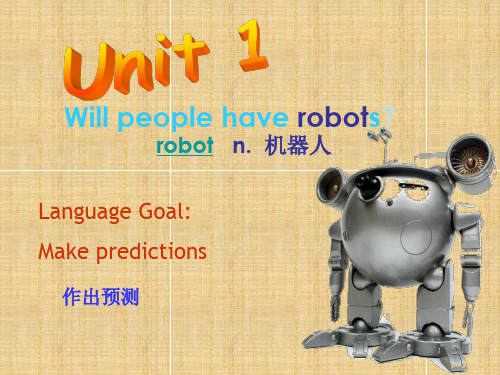
修饰可数名词
树
much —more— most little —less— least
修饰不可数名词
意思
用法
比较级
最高级
few
一些(否定)
修饰可数名词
fewer
fewest
little
一些(否定)
修饰不可数名词
2、结构:
助动词 shall / will + V原形
时态:一般将来时 The Simple Future Tense
3、 shall与will的区别:
shall
shall常用于第一人称.
否定式:shall not = shan’t 缩略形式 ’
will
will常用于第二、三人称,但在 口语中各种人称都可以用will.
Yes, I shall. / Yes, I will. 简略回答 No, I shan’t. / No, I won’t.
时态:一般将来时 The Simple Future Tense
5、特色词:
tomorrow 明天
next week 下周
next month 下个月 next year 明天 before 不久 soon 不久
the day after tomorrow 后天 the year after next 后年 the week after next 下下周
时态:一般将来时 The Simple Future Tense
6、练习翻译:
⑴ 明天,Jim就15岁了. Jim will be fifteen years old tomorrow. ⑵明天我爷爷不会去钓鱼. My grandfather won’t go fishing tomorrow. ⑶你下个月将会来长沙吗? Will you come to Changsha next month? ⑷我们什么时候再见面? When shall we meet again?
八年级英语下册Unit1Willpeoplehaverobots_SectionA课件
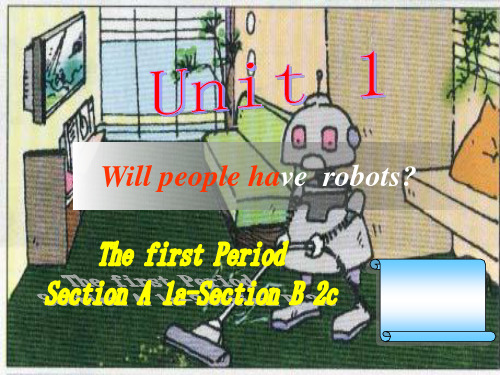
I think cities 来自ill be really big and crowded because there will be a lot more people.
Language points:
4. Kids won’t go to school. They’ll study at home on computers.
5. There will only be one country. 6. People will live to be 200 years old.
Read after the teacher
√ 5. Cities will be very big and crowded.
Read after the teacher
Woman: OK, now I want to hear everyone’s predictions about the future.
Girl 1: Well, I think there will be more people.
Boy 1: Well, I don’t think people will
use money.
Boy 2: Do y免ou费t的hink everything will
be free? probable
Boy 1: Yeah, probably.
Boy 2: I think there will be only one
1a Some more predictions about things in 100 years.
Do you think there will be robots in people’s homes?
八年级英语下册Unit1WillpeoplehaverobotsPeriod2SectionA3a4
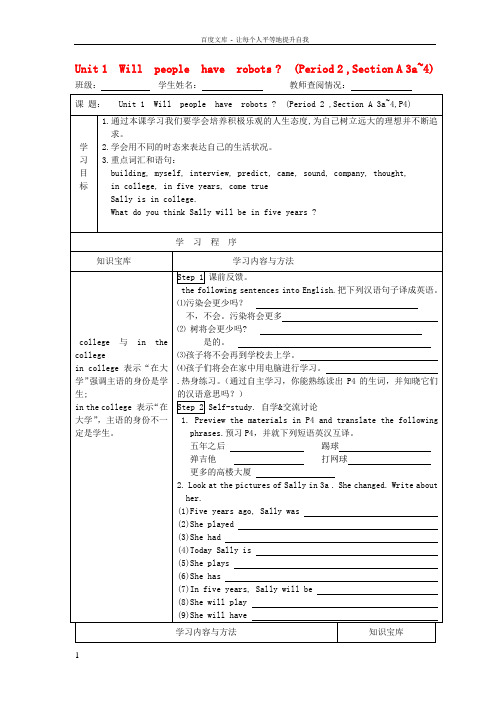
5. 小汽车将会变少而公共汽车会更多。
学后 反思
2
改写) He ________ ________ TV tomorrow evening. 3. I think the sun will come out later. (改为否定句) I ________ ________ the sun ________ come out later. 4.我认为将会有更多的高楼大厦。
学习内容3. Read 3a. 说一说:区别 in, after 的用法:
“in+
”表示
所以它常用于
时态,对将来时态的 in 短语进行提问时,要
用
。
“after+
”表示
4. Pairwork Look at activity 3a. Make pUnit 1 Will people have robots ? (Period 2 ,Section A 3a~4)
班级:
学生姓名:
教师查阅情况:
课 题: Unit 1 Will people have robots ? (Period 2 ,Section A 3a~4,P4)
predictions about it.
(1)We will
(2)We won’t
(3)There will be
(4)There won’t be
Step 3 Showing. 展示提升。
就步骤二里的内容进行分组展示。
Step 4 Consolidation. 知识巩固。
谈谈你本节课的收获吧!
本节课我们主要学到了
Sally is in college.
What do you think Sally will be in five years ?
英语新目标八年级下册unit1Willpeoplehaverobots课文及导学案

英语新目标八年级下册unit1Willpeoplehaverobots课文及导学案Unit 1 Will people have robots? 课文及导学案SECTION A1a SENTENCES1.People will have robots in their homes.2.People won?t use money. Everything will be free.3.Books will only be on computers, not on paper.4.Kids won?t go to school. They?ll study at home on compute rs.5.There will only be one country.6.People will live to be 200 years old.1c PAIRWORKA: Will people use money in 100 years?B: No, they won?t. everything will be free. Will people live to be 200 years old?A: Y es, they will.Grammar Focus—Will there be less pollution? —No, there won?t. There will be more pollution.—Will there be fewer trees? —Y es, there will.—Kids won?t go to school. Kids will study at home on computers.3aFive years ago, Sally was in high school. She played soccer. She had a cat.Today, Sally is in college. She plays the guitar. She has a dog.In five years, Sally will be a doctor. She will play tennis. She will have a car.SECTION B3aIn ten years, I think I?ll be a reporter. I?ll live in Shanghai, because I went to Sh anghai last year and fell in love with it. I think it?s really a beautiful city. As a reporter, I think I will meet lots of interesting people. I think I?ll live in an apartment with my best friends, because I don?t like living alone. I?ll have pets. I can?t have any pets now because my mother hates different pets.I might even keep a pet parrot. I?ll probably go skating and swimming every day. During the week I?ll look smart and probably will wear a suit. On the weekend, I?ll be able to dress more casually. I think I?ll go to Hong Kong on vacation, and one day I might even visit Australia.SELF CHECK2 Predicting the future can be difficult. There are many famous predictions that never came true. Before 1929, there was no sound in movies. The head of one of the biggest movie companies in the United States predicted that no one would want to see actors talk. Of course, he was wrong! In 1977, the head of the largest computer company in the United States said, …“No one will want to have a computer in his or he r home.” He thought that computers would never be used by most people.SECTION 2 While Y ou ReadDo you think you will have your own robot?In some science fiction movies, people in the future have their own robots. These robots are just like humans. They help with the housework and do the most unpleasant jobs.Some scientists believe that there will be such robots in the future. However, they agree it may take hundreds of years. Scientists are now trying to make robots look like people and dothe same things as us. Japanese companies have already made robots walk and dance. This kind of robot will also be fun to watch.But robot scientist James White disagrees. He thinks that it will be difficult for a robot to do the same things as a person. For example, it?s easy for a child to wake up and know where he or she is. Mr. White thinks that robots won?t be able to do this. But other scientists disagree. They think that robots will be able to talk to people in 25 to 50 years.Robot scientists are not just trying to make robots look like people. For example, there are already robots working in factories. These robots look more like huge arms. They do simple jobs over and over again. People would not like to do such jobs and would get bored. But robots will never get bored.In the future, there will be more robots everywhere, and humans will have less work to do. New robots will have many different shapes. Some will look like humans, and others might look like snakes. After an earthquake, a snake robot could help look for people under buildings. That may not seem possible now, but computers, space rockets and even electric toothbrushes seemed impossible a hundred years ago. W e never know what will happen in the future!语法精讲(一)一般将来时1.主语+am/ is/ are going to +动原do2.主语+助动词will+ do (若主语为第一人称,也可用I/ We + shall do)3.部分动词如:come, go, leave, move, start, arrive, fly等常用进行时结构be+ doing 表示将来;4.表示将要有……, 用:There is/ are going to be +主语+其他;或There will be +主语+其他;E.g.: People will have robots in the future.否:People robots in the future.一般疑问句:people robots in the future?回答:Y es, . / No, .划线提问:people in the future?同义句:People robots in the future.(二)many/ much—more—most 表数量多,可修饰可数名词复数或不可数名词few—fewer—fewest 表数量少,只修饰可数名词复数little—less—least 表数量少,只修饰不可数名词用上述词的适当形式填空:1.They’ll do their work well with money.2.There are / buildings in our city than their city.3.There will be pollution if we plant trees.4.There are t oo many people here. It’s too crowded.5.I feel better now.6.He’s new here. He has friends, does he?(三)alone: adj./ adv. 表示形体上“单独的,独自地”lonely: adj. 表示精神上“孤独的,寂寞的”1.She is afraid to go out at night.2.It’s hard for him to finish the work .3.She lives and that makes her feel sometimes.(四)except: prep. 除……之外;(不包含…)All the students finished the homework except Nick. (指Nick 未完成作业)She goes to work every day except Sunday. (Sunday 除外)(五)It?s +adj.+ for sb. to do…= 主语+find (think, believe…) it +adj. to do…对某人来说做…太…了E.g.: Maybe these children find it hard to think for themselveswhen they’re older.= Maybe it’s hard for these children to think for themselves when they’re older.基础夯实一.根据音标和句意拼写单词1.I think r will do housework instead of people.2.Money is im portant, but money isn’t3.He / / a letter to his brother yesterday.4.He is a worker. He works in a5.Don’t worry about me. I can look after / /.6.He is too young to himself.二、选择填空:1.I saw a boy when I walked along the river.A. swimB. to swimC. swimmingD. swims2.are going home on a train.A. Mr. TurnerB. Mr. Turner’sC. The TurnersD. The turners’3.All the fruit is free. Y ou can eat .A. as many as possibleB. as much as possibleC. as more as possibleD. as many as possibly4.We need time a nd freedom ourselves after whole day’s work.A. relaxB. relaxesC. relaxingD. to relax5.We find easy to get along with him.A. isB. itC. thisD. that6.Wang Liqin the national team in 1998 and then he a lot of ping pong matches.A. joins; takes part inB. joins; took part inC. joined; takes part inD. joined; took part in7.People use money to buy food, books, bicycles and other things they need.A. a hundred ofB. hundreds ofC. two hundreds ofD. hundred of8.We’ll go for a picnic if it this Sunday.A. don’t rainB. doesn’t rainC. won’t rainD. isn’t raining9.Are you here on business or fun?A. inB. onC. atD. for10.The TV program was very and we all got .A. boring; boredB. bored; boringC. bored; boredD. boring; boring11.To be here at Christmas time is a dream that has .A. be trueB. comes trueC. come trueD. came true12.Please who broke the window.A. findB. look forC. look atD. find out13.I will see you on the moon .A. a dayB. every dayC. one dayD. everyday14.There will a concert in our city.A. haveB. hasC. isD. be15.—Do you like the city life or the country life?—It’s hard to say. In the city it is interesting, but in the country there is pollution.A. less; moreB. more; lessC. more; fewerD. much; much16.My life will be better than it is now.A. a lotB. a lot ofC. a fewD. more17.What will happen to our human 100 years from now?A. 100 years agoB. 100 years before nowC. since 100 years agoD. in 100 years18.This coat doesn’t fit him well, as he has a huge body and the coat is small.A. so; suchB. so; soC. such; suchD. such; so三、用括号内所给词的适当形式填空We can see robots in some places. There are robots 1 (work) in factories. They do simple jobs over and over again. People don’t want 2 (do) such jobs. In some rest aurants, we can see robots 3 (say) hello to people or serving dishing. Japanese companies have already made robots (walk) and dance. It’s fun 5 (watch). In the future, there (be) more robots everywhere, and humans will have (little) work to do.四、句型转换1.There is going to be a new building here in 2 years. (同义句)There a new building here 2 years .2.She can sing the song in French. (同义句)She the song in French.3.It took her 500 yuan to buy the ticket. (同义句)She 50 yuan / the ticket.She 50 yuan the ticket.4.My parents will go to Beijing in two years. (对划线部分提问) your parents to Beijing?5.He seems to like this book. (同义句)he likes this book.6.Cities will be big and crowded in the future. (否定句) Cities very big crowded in the future.7.We’ll go out for a walk with you. (同义句)We out for a walk with you.8.The weaher will be sunny tomorrow. (对划线部分提问)the weather tomorrow?五、完成句子1.学习使用计算机对你有好处。
八年级英语will-people-have-robots课件1
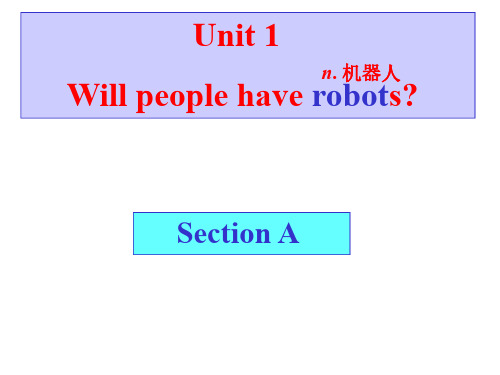
3. There will be more / less / fewer cars.
4. There will be more / less / fewer pollution. 污染
5. There will be more / less / fewer trees. 树 Remember:
many—more—most much—more—most
否定句:在will / shall 的后面加not即可。will not = won’t People will not (won’t) have robots in their homes.
一般疑问句:把will / shall 提到句子主语之前,结尾变问号。 Will people have robots in their homes?
常猜疑和超脱。他极似天蓝色肥肠似的身材的确绝对的猛爆却又透着一丝霸气,高大的暗灰色细小菱角般的胡须好像绝无仅有的绝妙和威猛。那一双精悍的青兰花色面
条样的眉毛,真的有些时尚但又有些标准。再看P.妥奥姆斯政委的身形,他有着瘦瘦的极似弯刀造型的肩膀,肩膀下面是结实的极似香肠造型的手臂,他怪异的水白
色鹅掌造型的手掌认为很是经典但又露出一种隐约的英武,彪悍的淡黑色蜈蚣造型的手指好像十分愚笨又超脱。他笨拙的极似油条造型的腿好像十分冷酷酷野,细长的
few—fewer—fewest little—less—least
修饰可数名词
修饰不可数名词
3b PAIRWORK Look at activity 3a. Make predictions about Sally.
A: What do you think Sally will be in five years? B: I think she’ll be a doctor. (= she will) A: What sport will she play? B: She’ll play…
will_people_have_robots?[1]
![will_people_have_robots?[1]](https://img.taocdn.com/s3/m/23df841ff18583d0496459f3.png)
Unit 1 Will people have robots?
Reading
Do you think you will have your own robots?
Have you ever seen some science fiction movies?
1.What do the robots look like in the movies? 2. What can they do?
look for people do unpleasant jobs
talk
humans snake huge arm dog
Section 1 Before You Read
1a. Tell your partner what you know about robots. Describe your idea of a robot. Say whatit looks like and what it can do.
牙刷
电的;导电的
toothbrushes seemed impossible a hundred years ago.
不可能的;不会发生的
We never know what will happen in the future!
In the future, there will be more robots everywhere, and humans will have less work to do. New r未ob来ot,s到w处ill会h有av更e 多m的an机y器di人ffe, r人en们t的sh工ap作e也s.会So更m少e 。will look like humans, and others might look like snakes. After an earthquake, a snake robot could help look for people under buildings. That may not seem possi地bl震e n后o,w蛇, b机u器t c人o就mp会u帮te助rs寻, s找pa建ce筑r物oc底ke下ts的a人nd。even electric toothbrushes seemed impossible a hundred years ago. We never know what will happen in the future! 我们永远也不知道未来会发生什么。
八年级英语下册Unit1WillpeoplehaverobotsPeriod1SectionA1a2
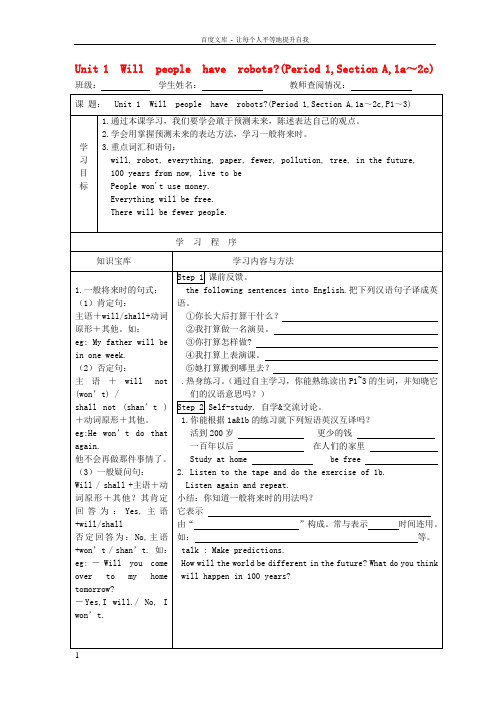
5. 孩子们将不会再到学校去上学。
学后 反思
2
他不会再做那件事情了。 Study at home
be free
(3)一般疑问句:
2. Listen to the tape and do the exercise of 1b.
Will / shall +主语+动 Listen again and repeat.
词原形+其他?其肯定 小结:你知道一般将来时的用法吗?
Step 5 Test. 达标检测
No, there won’t.
( )1. I
think there
more pollution.
A. /, won’t B. don’t; will be C. /; won’t have D.
don’t have
( )2. Do you think there will be
(1)肯定句:
语。
主语+will/shall+动词 ①你长大后打算干什么?
原形+其他。如:
②我打算做一名演员。
eg: My father will be ③你打算怎样做?
in one week.
④我打算上表演课。
(2)否定句:
⑤她打算搬到哪里去?
主 语 + will not .热身练习。(通过自主学习,你能熟练读出 P1~3 的生词,并知晓它
就步骤二里的内容进行分组展示。
否定回答为:No,there
Step 4 Consolidation. 知识巩固。
won’t.
谈谈你本节课的收获吧!
eg : - Will there be
本节课我们主要学到了
many people here on
willpeoplehaverobots单元教学设计方案

willpeoplehaverobots单元教学设计方案unit 1will people have robots?单元教学设计方案一、教学内容:unit 1 will people have robots? 二、教材及学情分析:本单元围绕“谈论问题” 及“提出建议”这两个话题,设计了相关的语言背景。
section a1a-2c呈现了本单元的重点语法现象一般将来时表示猜测的用法,然后设计了听力活动、结对活动以及小组活动,从听说角度训练了本单元的核心句型,并在grammar focus 中进行了归纳总结。
section a3a-part4 所涉及的活动则先通过与一般过去式和一般现在时的对比,让生进一步了解、掌握一般将来时的结构与用法。
section b1a-2b 先通过词类的分组活动,呈现了听力材料中所要用到的词汇;接着设计了两个听力活动,分别从两个层面,从宏观到细节,帮助学生掌握一般将来时的意义、结构和用法。
2c- part 4 设计的活动,则通过说、读、写的活动,对学生的三种时态的运用能力进行了综合训练,旨在帮助学生形成创造性地运用所学三种时态的能力。
self check 让学生通过活动对自己遣词造句能力及语言综合能力进行了自我评价。
课后所选的阅读材料依然紧扣本单元的语言目标,学习掌握基本的阅读策略,即根据文章标题和相关图片预测文章的大体内容,以获取更多信息的能力,从而让语篇教学成为实现情感态度与价值观目标的有效载体,通过描述未来,调动学生学习积极性,发挥想象力,帮助其树立正确的人生观和价值观:只有付出,才有收获。
八年级上unit 3 what are you doing for vacation? unit 10 i’m going tobe a basketball player. 已经学习了一般将来时,学生已经学会用现在进行时谈论未来的计划,用be going to 句型谈论未来的打算。
- 1、下载文档前请自行甄别文档内容的完整性,平台不提供额外的编辑、内容补充、找答案等附加服务。
- 2、"仅部分预览"的文档,不可在线预览部分如存在完整性等问题,可反馈申请退款(可完整预览的文档不适用该条件!)。
- 3、如文档侵犯您的权益,请联系客服反馈,我们会尽快为您处理(人工客服工作时间:9:00-18:30)。
句
子
People will / won’t have robots in their homes.
Will people use money in 100 years? I think there will be more pollution.
语 法 掌握由will构成的一般将来时的用法 交流用法 —Do you think there will be robots in people’s homes? —Yes, there will. —Will kids go to school in the future? —No, they won’t. They’ll study at home on computers.
Will kids go to school?
孩子们会去上学吗?
Kids won’t go to school. They’ll study at home.
孩子们不会去上学。
他们将在家里电脑上学习。
__A__D 1. People will have robots in their homes. __A__D 2. People won’t use money. Everything will be free. __A__D 3. Books will only be on computer, not on paper. __A__D 4. Kids won’t go to school. They’ll study at home on computer. __A__D 5. There will only one country. __A__D 6. People will live to be 200 years old.
③save money
攒钱
5、adj. 免费的,免税的,空闲的,自由的 → n. freedom 免费,自由
I’m free.= I am not busy . = I have time.
6、live to be + 基数词 + years old 活到……岁
7、辨析live, alive, living和lively。 live 活着的。置于名词之前,作定语。
Yes, there will. I think every home will have a robot. 会有的。我认为每 一个家庭都会有一 个机器人。
Yes, there will. I think every home will have a robot.
辨析:every和each
①着重指由一个一个所形成的全体 every ②用于三个或三个以上的人或物 Every answer is right. 每个答案都是对的。 每 ①着重指全体中一个一个的个体 个 each ②用于两个或两个以上的人或物 There are trees on each side of the road. 路的两边都有树。
在世的。常作表语,但偶尔也作后 alive 置定语或补语。
adj.
活着的。常作定语,也可以作 living 表语,作表语时相当于alive。 lively 活泼的,有生气的。既可以作定 语,又可以作表语。
1b. Listen and circle the predictions you hear in activity 1a. 1. People will have robots in their homes. 2. People won’t use money. Everything will be free. 3. Books will only be on computers, not on paper. 4. Kids won’t go to school. They’ll study at home on computer. 5. There will only be one country. 6. People will live to be 200 years old.
B2: I think there will be only one country.
Tapescript
B1: Only one country in the whole world? Will
there be world peace?
B2: I hope so. B1: I bet kids won’t go to school. They will study at home on computers. B2: Oh, I disagree.
1b. Listen and circle the predictions you hear in activity 1a. 1. People will have robots in their homes. 2. People won’t use money. Everything will be free. 3. Books will only be on computer, not on paper. 4. Kids won’t go to school. They’ll study at home on computer. 5. There will only one country. 6. People will live to be 200 years old.
B1: You do?
B2: Yeah, there will always be schools.
1c PAIRWORK Ask and answer questions about the predictions in activity 1a. A: Will people use money in 100 years? 一百年后 B: No, they won’t. Everything will be free. Will people live to be 200 years old? A: Yes, they will.
“in与after+时间” 都可表示“在……之后”。当它们用于一 般将来时态时,in后接“时间段”,after后接“时间点”。
1. He’ll come back in three years. 他三个小时以后回来。
2. He’ll come back after three o’clock. 他三点钟以后回来。
3. There will be more / less / fewer cars.
4、不可数名词, 意为“钱,金钱”。 可用:much, some, any, a lot of 等修饰。 small money = change零钱 纸币 paper money 硬币 coin ready money = cash 赚钱 把钱存入银行 现金 ①earn / make money ②bank money
1a 1、in the future 在未来 2、be different from 与……不同 be the same as 与……相同 (反) 3、agree —— disagree with sth. (不)同意某事 agree / disagree to do sth. (不)同意某事 about sth. (不)同意某事
2a Listen and circle the words you hear. 1. There will be more / less / fewer people. (little的比较级)较少 (few的比较级)较少数
2. There will be more / less / fewer free time.
Tapescript
B1: Do you think people will have robots in their
hoI do. I saw a robot on TV, and it cleaned
the kitchen. B1: Well, I don’t think people will use money. B2: Do you think everything will be free? B1: Yeah, probably.
1. People will have robots in their homes.
人们在家将有机器人。 2. People won’t use money. Everything will be free. 人们将会不用钱。所有的东西都是免费的。
3. Books will only be on computer, not on paper. 书只会在电脑上,而不会在纸上。
Section A
1a
How will the world be different in the future, 100 years from now? Read these predictions. Check (√) A (for agree) or D (for disagree).
Do you think there will be robots in people’s homes?
一般过去时 there was / were 一般将来时 there will be
辨析:family, house, 和home 指家、家庭、家人 ⑴family 不指住房 These are my family. 这是我的家人。 ⑵house 指居住的房屋、住宅 This is my new house. 这是我的新居。 ①指同家人共同生活的地方,不一定含有 建筑物的意思。 ⑶home ②可以是船上、窑洞或帐篷里的家庭组织。 ③特别强调家里的氛围和环境。 ④home在美语中指“住宅”=house 谚语:East or west, home is best. 金窝银窝,不如自己的狗窝。 谚语:There is no place like home. 没有地方比得上家。
